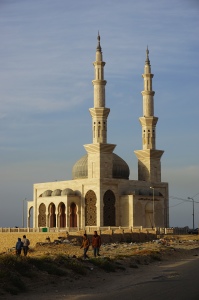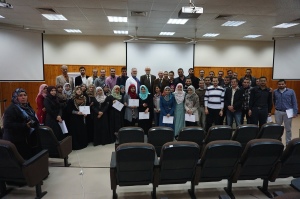March 26, the grief and bereavement of Gaza, by Gerri Haynes
(Washington Physicians for Social Responsibility has traveled to Gaza since 1993. Since 2009, following the Cast Lead invasion by Israel, WPSR has sponsored nine medical delegations to serve the people of Gaza.)
For about 25 years, I’ve facilitated a wonderful group for Moms who have experienced the death of one or more of their children. I’ve taught in the US, Canada, Israel, Palestine, and Iraq.
Today, I spent three hours with a group of medical professionals who are studying with the Gaza Community Mental Health Programme. They are steeped in the grief and bereavement of Gaza.
Believing that everything that happens is from Allah, these students were gracious in our discussion that sadness is still a part of what happens when a loved one dies or a community is demolished.
Some members of this group had experienced the death of a relative in last year’s assault on Gaza. Everyone acknowledged the sense that another attack is possible and that all of Gaza lives with this reality.
Discussing grief and bereavement in a frequent war zone means
re-examining context. Gaza has been under a severe siege by Israel since 2007. Three major assaults by bombing have resulted in loss of life and the widespread destruction of homes and livelihood.To study grief here requires a global view. Here there is grief over the loss of freedom, the lack of security, limited access to economic possibility, compromised education, no clean water – the list is long and touches nearly all aspects of life. Against this ongoing and unrelieved list of sorrows exists the ever-present reality of armed drones and patrolling gunships.
Today, we talked about no “post” to traumatic stress injury. We spoke of Continuous Traumatic Stress Injury (CTSI) instead of Post Traumatic Stress Disorder (PTSD) and how CTSI is, in itself, a focus of grief.
Continuous injury implies that healing is an ongoing and repetitive (and incomplete) process. And we acknowledged the reality that “broken heart syndrome” may be present here – the reality that the most faithful person may have overwhelming sorrow.
The cycle of grief, moving from shock to reinvestment (through denial, magical thinking, reality, pain and reorganization) still occurs. The shock of grief may mimic hemorrhagic shock in its affect on body function – including a clouding of thought and mental processing.
We talked about the difference between a slow death from illness and the death associated with war. It was a good discussion.
As we reviewed the organization of a decision-making process that can help patients and families approach a terminal illness with greater awareness of choice, we celebrated that families always participate here – care in Gaza is family-centered, with extended family members always accompanying a patient seeking care.
The First Palestinian Turkish Conference of Surgery, the conference that occasioned this journey to Gaza, began this morning. Grant O’Keefe gave two lectures today and will speak again tomorrow.
Grant is a great teacher and some members of our group were able to attend the conference and hear Grant’s messages about trauma care – essential messages in this traumatized land.
RSS feed for comments on this post. TrackBack URI

